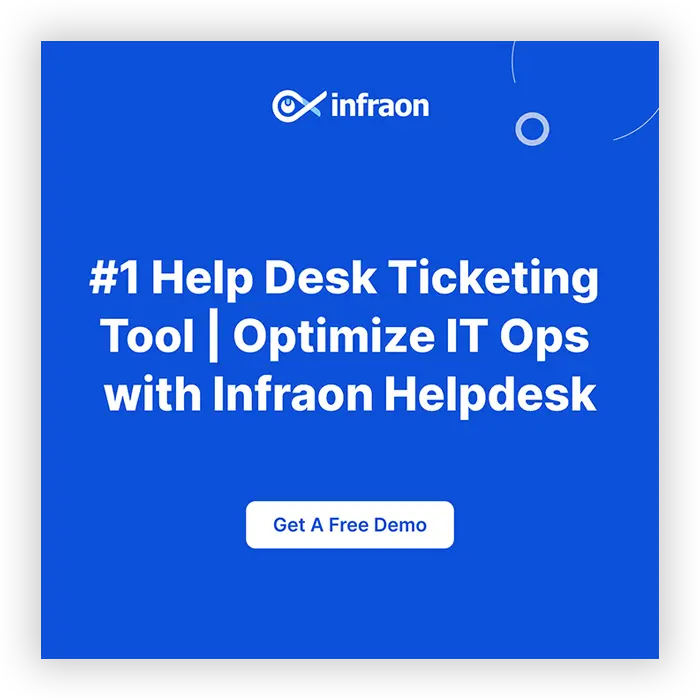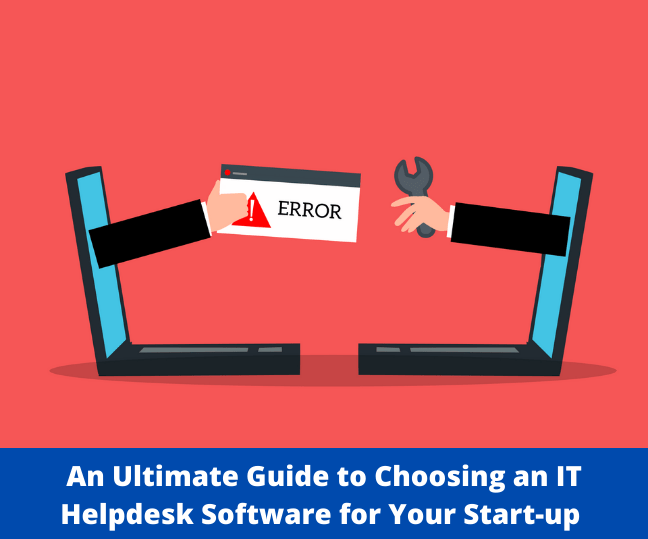The basis of any successful customer service department is a responsive helpdesk ticketing system. As the world heads into 2025, the landscape of these systems is more innovative than ever, providing features that cater to the needs of large and small organizations. From AI-powered automation to intuitive user interfaces, these systems are focused on solving problems while redefining the very nature of customer support.
This year’s roundup includes ticketing systems that have continuously evolved to keep up with the changing dynamics of customer interactions and support trends. We’ve witnessed a significant shift towards omnichannel support, predictive analytics, and integrated self-service options aimed at providing faster resolutions and more personalized customer experiences.
Related blog: 20 Best IT Asset Management Software in 2024: ITAM Tools and Solutions
So, let’s discuss the top 20 helpdesk ticketing systems (in no specific order), highlighting their pros, cons, key features, and recommended use cases.
Table of Content
Best Helpdesk Ticketing Systems 👇
Zendesk
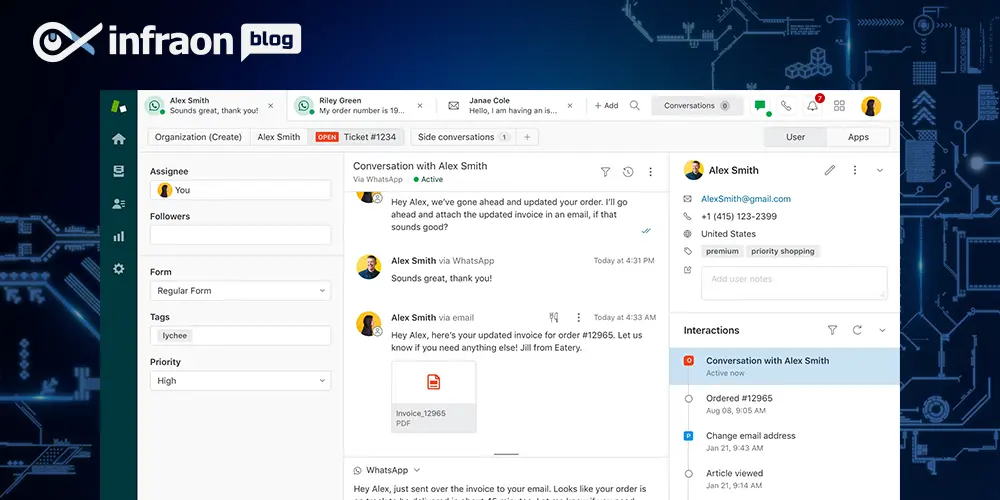
Use Cases:
Zendesk is an excellent choice for larger enterprises and organizations with complex support needs. It offers the flexibility to adapt to specific requirements and provides robust Reporting and analytics for data-driven decision-making. Organizations looking to provide a unified and seamless customer experience across multiple touchpoints can leverage Zendesk’s comprehensive features.
Pros:
- Highly customizable: Zendesk offers extensive customization options, making it adaptable to various business needs, from IT support to customer service.
- Extensive integrations: Zendesk seamlessly integrates with various third-party tools and applications, enhancing its capabilities. This extensive integration potential allows businesses to connect Zendesk with their existing software ecosystem for a unified user experience.
- AI-powered chatbots: Zendesk leverages AI to enhance self-service options and improve response times. AI chatbots provide immediate assistance, resolve basic queries, and offer 24/7 support availability.
Cons:
- Complex setup for beginners: The high degree of customization and features can be overwhelming for new users, requiring time and effort to set up. Organizations may need to invest more time in training and onboarding.
- Cost considerations: While Zendesk is feature-rich, its pricing may be prohibitive for those with small budgets. The cost can increase significantly as an organization scales and requires advanced features.
Intercom
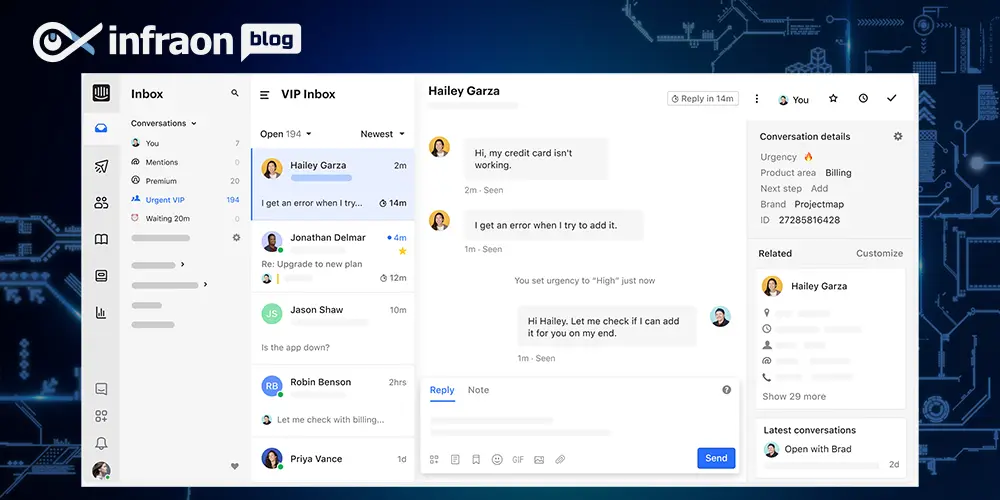
Use Cases:
Intercom is an excellent choice for businesses that prioritize customer engagement and want to merge their support and marketing efforts. It is particularly beneficial for companies that use in-app messaging as a primary communication channel or require real-time support interactions.
Pros:
- Conversational support: Intercom focuses on conversations and real-time interactions, which is ideal for businesses with a strong emphasis on customer engagement.
- Integration with marketing tools: Intercom seamlessly integrates with marketing automation tools, making it suitable for organizations looking to merge their customer support and marketing efforts.
- In-app messaging: The platform allows businesses to engage with users directly through in-app messaging, enhancing the user experience and reducing support ticket volume.
Cons:
- Cost considerations: Intercom may be relatively expensive for smaller businesses or startups.
- Learning curve: The platform’s unique approach to support may require some time for agents to adapt to the conversational support model.
Infraon Helpdesk
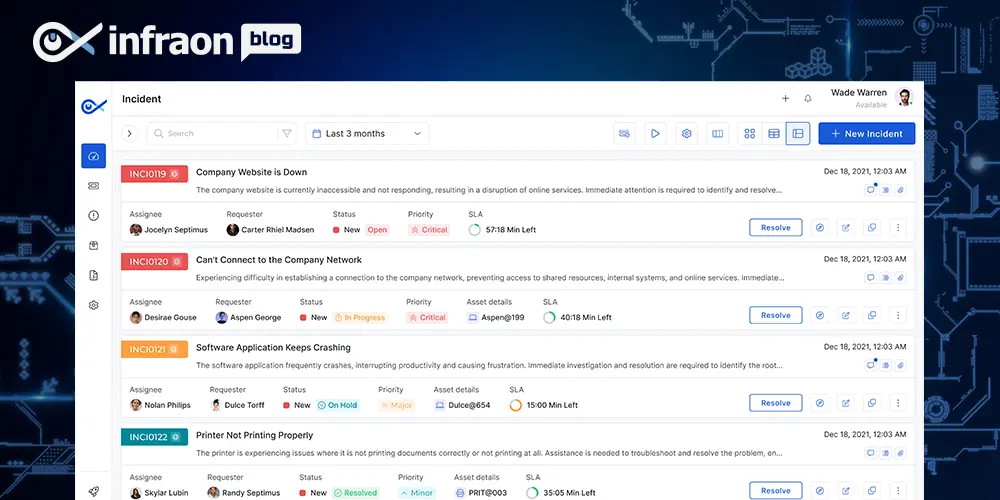
Use Cases:
Infraon Helpdesk is a versatile solution that caters to businesses looking for a feature-rich, customizable, and multichannel support platform. It is ideal for telecom companies, banks, SMEs, etc., seeking adaptability, automation, and efficient support across several communication channels.
Pros:
- Support ticket management: Infraon Helpdesk is a Generative-AI-enabled helpdesk system that offers a unique approach to support and agent collaboration. It uses automated ticket management to increase customer delight by enabling the right agent with the right skill set to respond to the right customers.
- Automated collaboration: Increase collaboration with collaboration and communication system that enhanced ticket visibility, and centralized knowledgebase to improve key support metrics.
- Reporting and analytics: Get equipped with powerful, real-time data analytics and BI-rich reports through a customizable dashboard to track SLAs, locate bottlenecks, etc.
- External integration: Connect to popular external apps like Microsoft Teams, Slack, WhatsApp, etc.
- Workflow automation: Leverage platform accelerators to automate support workflows like ticket creation and assignment, agent tracking and prioritization, etc.
Cons:
- Limited language support: Infraon Helpdesk may have a more limited range of language options than some competitors, which could be a factor for businesses with multilingual support needs.
- Mobile app features: While Infraon Helpdesk offers a mobile app for on-the-go access, some users may find that the mobile app has slightly fewer features compared to the web version, which could affect their mobile workflow.
HubSpot Service Hub
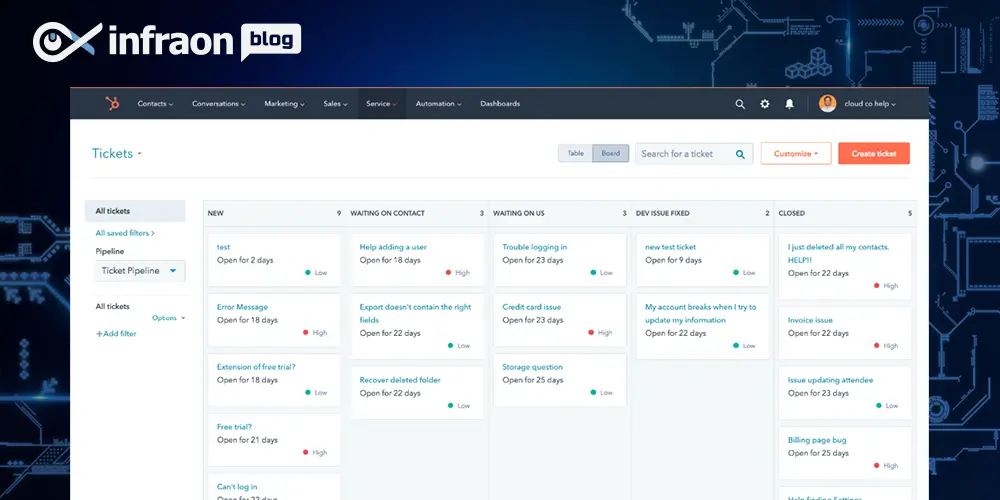
Use Cases:
HubSpot Service Hub is a strong choice for businesses seeking an all-in-one solution that combines CRM, marketing, sales, and support. It is ideal for organizations that aim to deliver a cohesive customer experience across all touchpoints. This platform is well-suited for businesses aligning their marketing, sales, and support operations on a single, integrated platform to provide personalized and efficient support.
Pros:
- Part of the HubSpot ecosystem: HubSpot Service Hub seamlessly integrates with the HubSpot CRM, providing a unified platform for marketing, sales, and support. This integration facilitates cross-functional collaboration and data sharing.
- Integrated CRM: Users benefit from a full-featured CRM, enhancing customer management and interactions. The integrated CRM ensures that support agents have access to valuable customer information, leading to more personalized support interactions.
- Knowledge base: The platform includes a knowledge base to empower users with self-service options. The knowledge base allows customers to find answers to their questions independently, reducing the workload on support teams.
Cons:
- Learning curve: While HubSpot Service Hub is powerful, its comprehensive features may require time for users to become proficient. Organizations must allocate resources for training and onboarding to maximize the system’s potential.
- Costs: HubSpot’s full suite of tools may be cost-prohibitive for smaller businesses with limited budgets. Organizations must carefully consider their budget constraints and ensure that the benefits of using HubSpot Service Hub justify the costs.
Zoho Desk
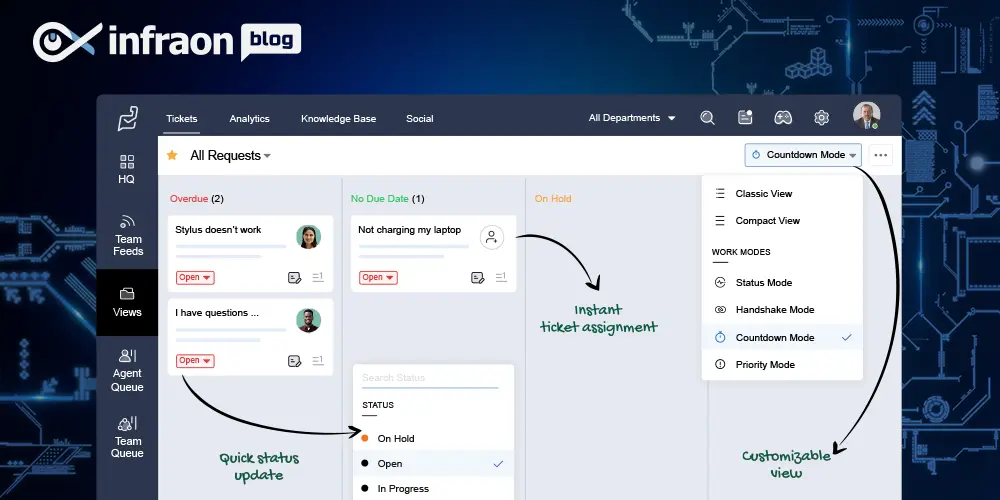
Use Cases:
Zoho Desk is an ideal choice for small to medium-sized businesses looking for a cost-effective and feature-rich helpdesk solution. It caters to organizations that prioritize affordability without sacrificing essential functionality. Businesses seeking to provide efficient and responsive support without breaking the bank can benefit from Zoho Desk’s capabilities.
Pros:
- Multichannel support: Zoho Desk allows users to manage support inquiries from various communication channels, including email, social media, and chat. The multichannel approach ensures customers can connect with support teams through their preferred channels.
- Affordable pricing: Zoho Desk offers competitive pricing, making it accessible to businesses of all sizes. The cost-effective pricing structure allows organizations to benefit from robust ticketing and support capabilities without breaking the bank.
- Advanced automation: The system provides many automation options to streamline support processes. Automation reduces manual tasks, increases efficiency, and allows support teams to manage more inquiries.
Cons:
- May lack some advanced features: While Zoho Desk is feature-rich, it may not offer the same level of customization and advanced capabilities as some enterprise-focused solutions. Organizations with complex and highly specific requirements may find some features lacking.
- Limited scalability: Larger organizations with complex support needs may find Zoho Desk’s scalability limitations. While it suits small to medium-sized businesses, enterprises may require more extensive customization and scalability options.
Freshdesk
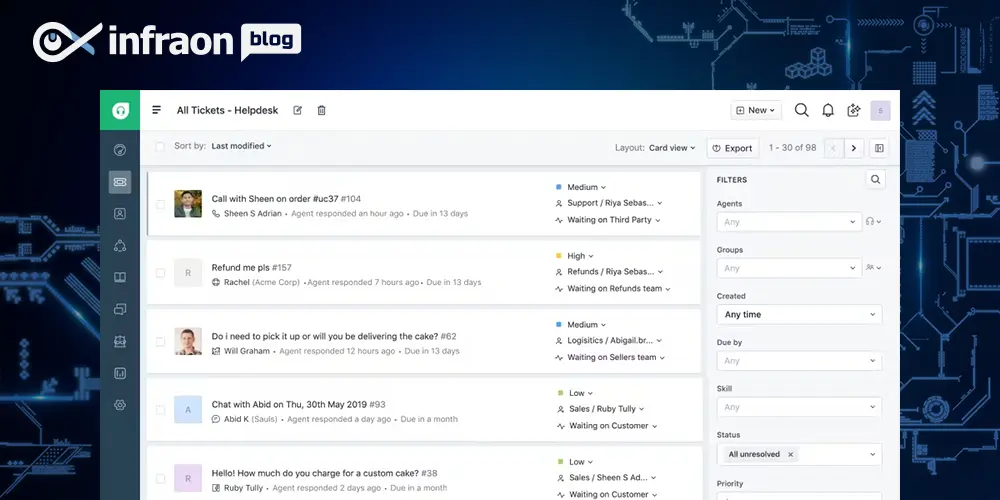
Use Cases:
Freshdesk is well-suited for small to medium-sized businesses seeking a straightforward, user-friendly, and affordable helpdesk solution. The intuitive design and comprehensive automation capabilities make it ideal for organizations that value ease of use and efficient support operations. Businesses looking to provide responsive support with a streamlined system can leverage Freshdesk’s features.
Pros:
- Intuitive interface: Freshdesk boasts a user-friendly interface that simplifies support operations for both agents and customers. The intuitive design reduces the learning curve for new users and minimizes training requirements.
- Multichannel support: The system allows users to manage support inquiries from various channels, including email, chat, and phone. Multichannel support ensures that customers can reach out through their preferred communication channels.
- Comprehensive automation: Freshdesk offers automation options for efficient issue resolution and customer engagement. The extensive automation capabilities improve support team efficiency and customer interactions.
Cons:
- Limited scalability: Larger organizations may find Freshdesk’s scalability limited compared to enterprise-focused solutions. The platform may not provide the advanced customization and scalability options required by large enterprises with complex support operations.
- Pricing tiers: While Freshdesk offers affordable pricing, some advanced features may only be available in higher-priced tiers. Organizations must carefully assess their feature requirements and budget constraints when selecting a pricing tier.
Gorgias:
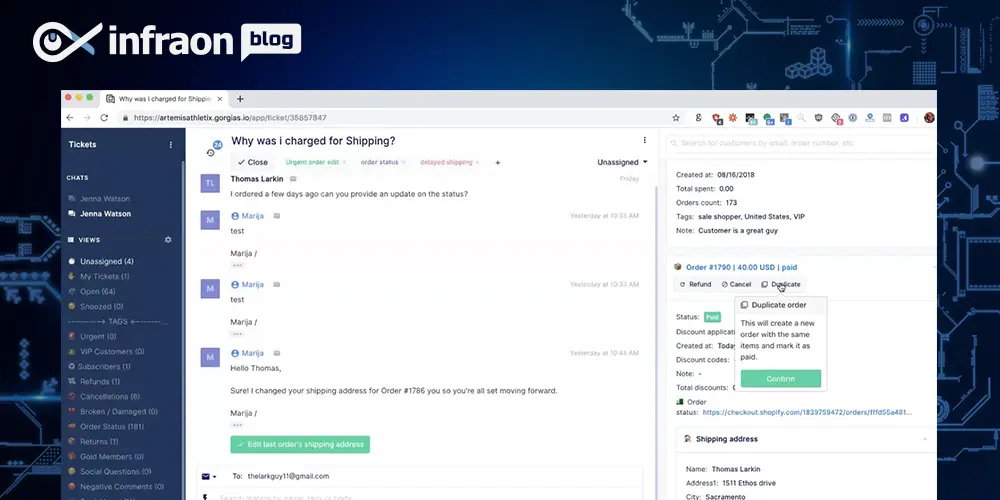
Use Cases:
Gorgias is an excellent choice for online retailers and businesses that rely on e-commerce platforms for their operations. It is well-suited for companies seeking to streamline support and automate e-commerce-specific tasks efficiently.
Pros:
- E-commerce focus: Gorgias is tailored for e-commerce support, making it ideal for online retailers and businesses that require specialized support features.
- Integrations with e-commerce platforms: The platform seamlessly integrates with various e-commerce platforms, streamlining support operations for online businesses.
- Automation for e-commerce tasks: Gorgias offers advanced automation for e-commerce support tasks, improving efficiency in handling customer inquiries.
Cons:
- Industry-specific focus: Gorgias’ specialization in e-commerce may limit its versatility for businesses outside the e-commerce sector.
- Learning curve: The platform’s industry-specific features may require training and adaptation for support agents unfamiliar with e-commerce operations.
Front
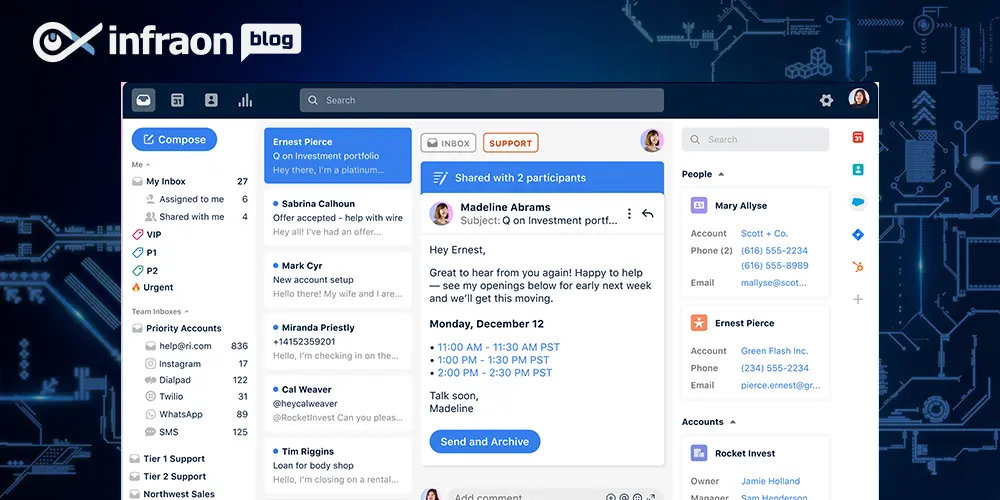
Use Cases:
The Front is an excellent choice for businesses with multiple support agents and teams looking to enhance collaboration and streamline communication. Its adaptability and extensive integrations make it suitable for organizations with specific requirements and the need for a customizable solution.
Pros:
- Collaborative features: Front fosters team collaboration by centralizing communication and support channels, making it ideal for businesses with multiple support agents.
- Integration with various tools: The platform integrates seamlessly with various third-party tools, enhancing its functionality and compatibility.
- Customizable: Front offers extensive customization options, allowing organizations to meet specific needs.
Cons:
- Learning curve: The extensive features and customization options may require time for agents to become proficient with the platform.
- Potential cost concerns: While Front offers valuable collaborative features, the pricing structure may be a consideration for smaller businesses with limited budgets.
HelpDesk
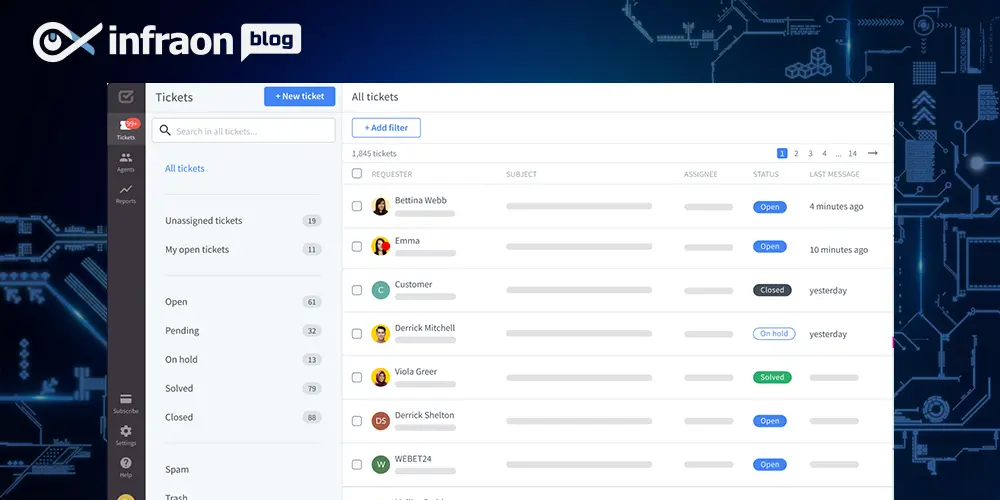
Use Cases:
HelpDesk is well-suited for small to medium-sized businesses looking for a user-friendly and easy-to-implement ticketing system. It caters to organizations that prioritize simplicity and efficiency in their support operations. This system is particularly beneficial for companies with limited IT resources or those looking to expedite support operations without complex configurations.
Pros:
- User-friendly interface: HelpDesk offers an intuitive and straightforward interface, making it easy for support agents and end-users to navigate. This simplicity enhances user adoption and reduces training time.
- Automated ticket assignment: The system streamlines ticket distribution, ensuring that issues are assigned to the right agents promptly. This automation improves response times and prevents ticket backlogs.
- Real-time ticket tracking: Users can monitor the progress of their support requests in real-time. Real-time tracking provides transparency, instills customer confidence, and allows them to anticipate issue resolution timelines.
Cons:
- Limited Reporting and Analytics capabilities: While HelpDesk excels in ticket management, its Reporting and analytics features may not meet the advanced needs of larger enterprises. So, those with complex data analysis requirements may find the system’s reporting options somewhat basic.
Help Scout
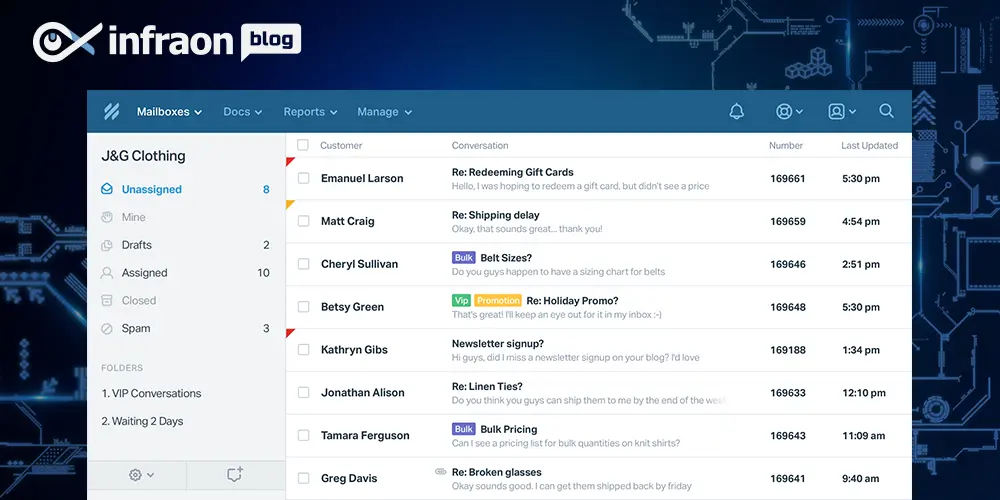
Use Cases:
Help Scout is an ideal choice for organizations that prioritize simplicity, ease of use, and team collaboration in their support operations. It is well-suited for small to medium-sized businesses looking for a straightforward and efficient ticketing system.
Pros:
- Ease of use: Help Scout’s user-friendly design makes it accessible to support agents and customers.
- Collaboration features: The platform encourages team collaboration, making it suitable for organizations with multiple support agents and teams.
- Reporting and analytics: Help Scout provides valuable insights through Reporting and analytics, allowing businesses to track and optimize their support operations.
Cons:
- May lack some advanced features: While Help Scout is feature-rich, it may not offer the same level of customization and advanced capabilities as some enterprise-focused solutions.
- Potential cost considerations: The pricing structure may be a factor for organizations with limited budgets.
LiveAgent
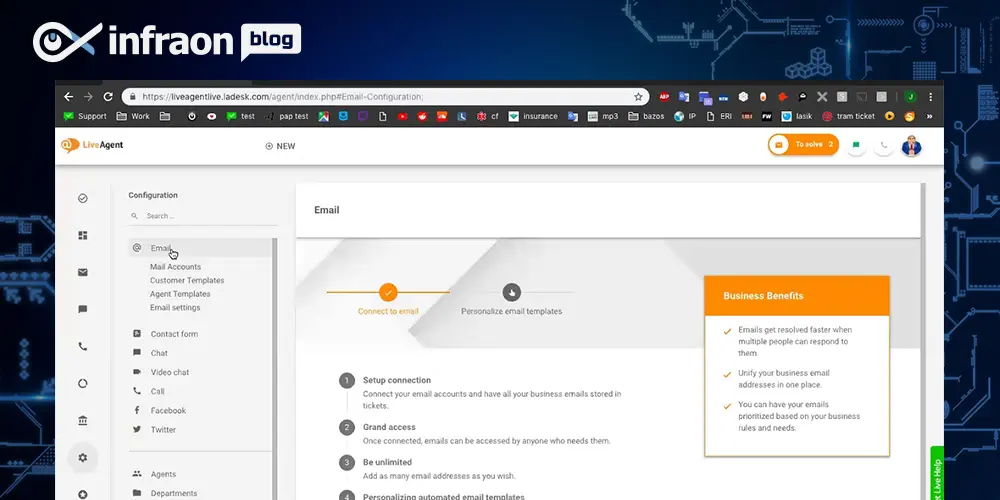
Use Cases:
LiveAgent is a versatile solution for businesses seeking a feature-rich, customizable, multichannel support platform. It caters to organizations that value adaptability, performance, and support across various communication channels.
Pros:
- Multichannel support: LiveAgent offers a robust multichannel approach to customer support, allowing businesses to manage inquiries from various communication channels.
- Customizable: The platform provides extensive customization options, enabling organizations to tailor the system to their specific requirements.
- Reporting and analytics: LiveAgent includes advanced Reporting and analytics tools, offering valuable insights for optimizing support operations.
Cons:
- Learning curve: The system’s feature-rich interface may require training for new users to fully grasp its capabilities.
- Pricing considerations: While LiveAgent offers competitive pricing, the cost may become a factor for smaller businesses with limited budgets, especially as user counts increase.
Spiceworks Cloud Helpdesk
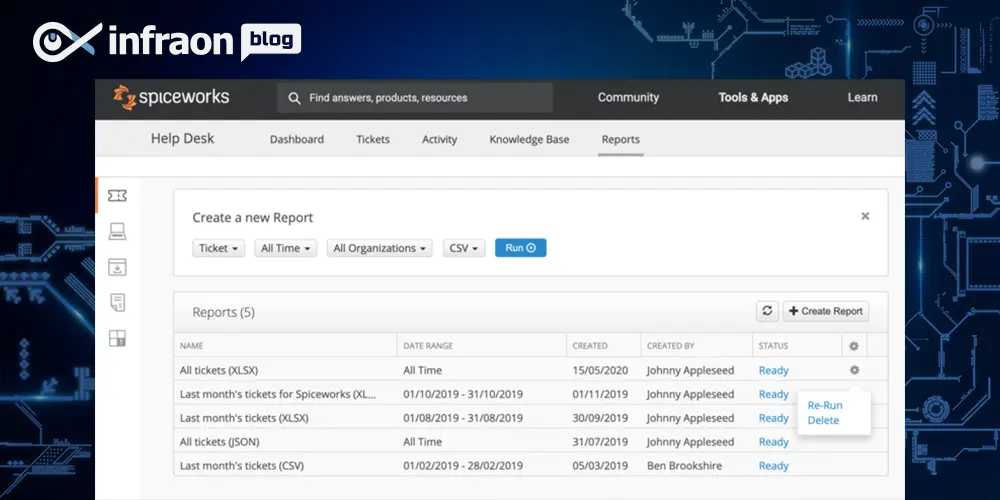
Use Cases:
Spiceworks Cloud Helpdesk is an excellent choice for small to medium-sized businesses, especially those in the IT sector, looking for a free and specialized solution. It is particularly beneficial for IT professionals seeking IT-centric features and a community of peers.
Pros:
- Free of charge: Spiceworks Cloud Helpdesk is a free solution, making it accessible to organizations with budget constraints.
- IT-centric: The platform is tailored to IT support, with features specifically designed for IT professionals.
- User community: Spiceworks offers a vibrant community where IT professionals can exchange ideas and solutions.
Cons:
- Limited scalability: The free version may have limitations for larger organizations or businesses with complex support needs.
- May not suit non-IT support: Spiceworks is primarily designed for IT support, so organizations seeking broader helpdesk functionality may find it lacking.
SolarWinds Web Helpdesk
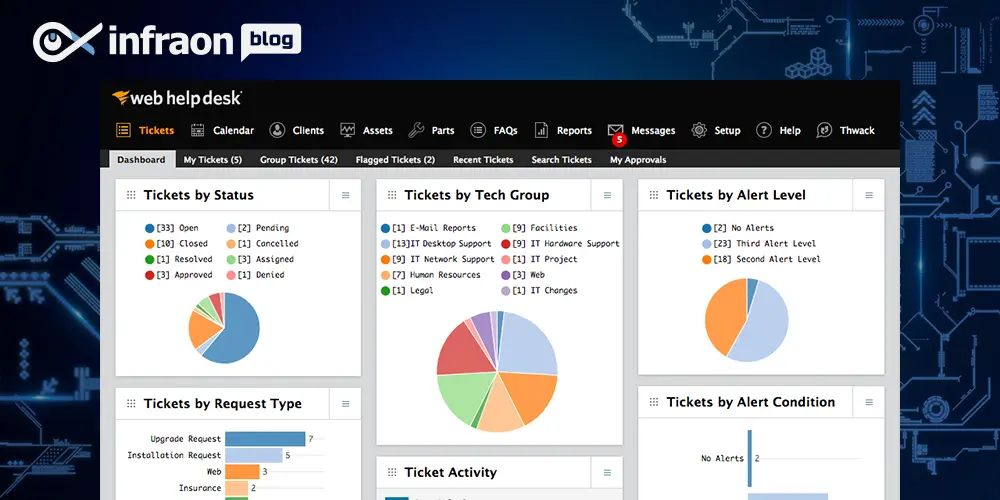
Use Cases:
SolarWinds Web Helpdesk is an ideal choice for organizations with complex IT support needs and those already using SolarWinds products. It caters to businesses seeking extensive IT service management and in-depth reporting capabilities for comprehensive support.
Pros:
- IT service management: SolarWinds Web Helpdesk offers comprehensive IT service management capabilities, making it suitable for businesses with complex IT support needs.
- Integration with other SolarWinds products: The platform seamlessly integrates with other SolarWinds tools, creating an integrated IT management ecosystem.
- Reporting and analytics: SolarWinds Web Helpdesk provides advanced Reporting and analytics for in-depth insights into support operations.
Cons:
- Complexity: The platform’s advanced features may have a steeper learning curve, requiring more time for agents to adapt.
- Potential cost considerations: The cost may be a factor for smaller businesses with limited budgets or those not requiring extensive IT service management.
Mojo Helpdesk
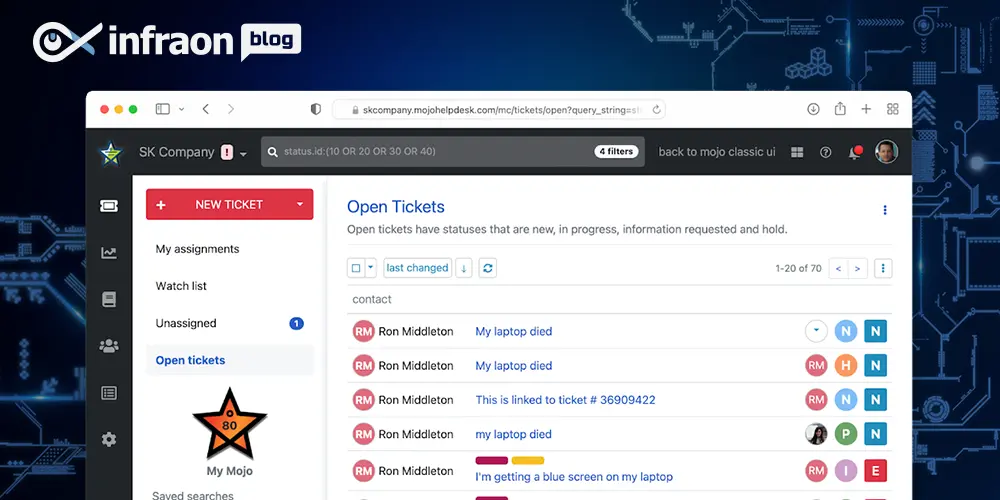
Use Cases:
Mojo Helpdesk is an excellent choice for small to medium-sized businesses seeking a straightforward, user-friendly, and customizable helpdesk solution. It is well-suited for organizations enhancing self-service options and streamlining support operations.
Pros:
- Simplicity: Mojo Helpdesk offers a straightforward and user-friendly design, making it accessible to support agents and customers.
- Customizable: The platform provides customization options to adapt the system to specific support requirements.
- Knowledge base: Mojo Helpdesk includes a knowledge base for self-service and efficient issue resolution.
Cons:
- May lack some advanced features: While Mojo Helpdesk is feature-rich, it may not offer the same level of customization and advanced capabilities as some enterprise-focused solutions.
- Limited scalability: The platform’s scalability may have limitations for larger organizations with complex support needs.
Vivantio
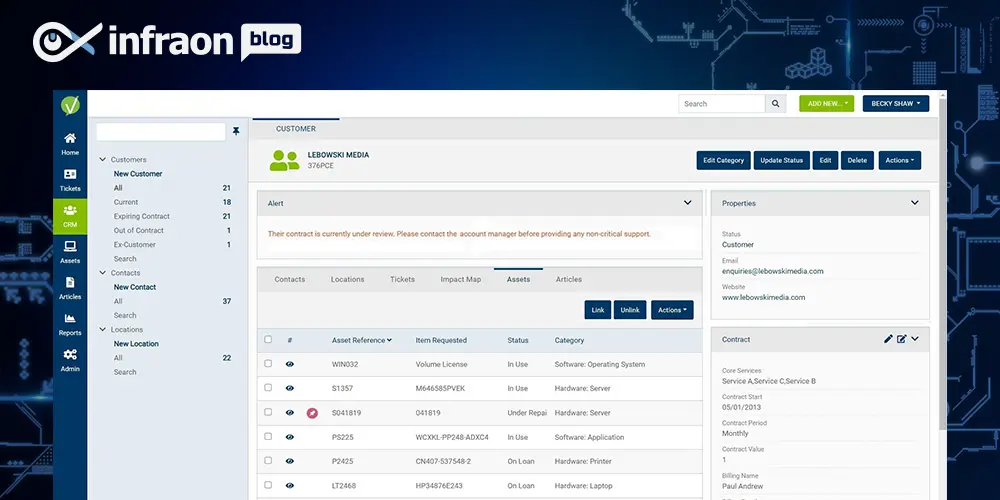
Use Cases:
Vivantio is an ideal choice for organizations with complex IT support needs and those seeking extensive IT service management capabilities. It caters to businesses looking for advanced customization and in-depth reporting for comprehensive support.
Pros:
- IT service management: Vivantio provides comprehensive IT service management power, making it ideal for those with complex IT support needs.
- Customizable: The platform offers extensive customization options, allowing organizations to adapt the system to their specific support requirements.
- Reporting and analytics: Vivantio includes advanced Reporting and analytics tools, providing in-depth insights into support operations.
Cons:
- Complexity: Vivantio’s advanced features may have a steeper learning curve, requiring more time for agents to adapt.
- Potential cost considerations: The cost may be a factor for smaller businesses with limited budgets or those not requiring extensive IT service management.
HappyFox
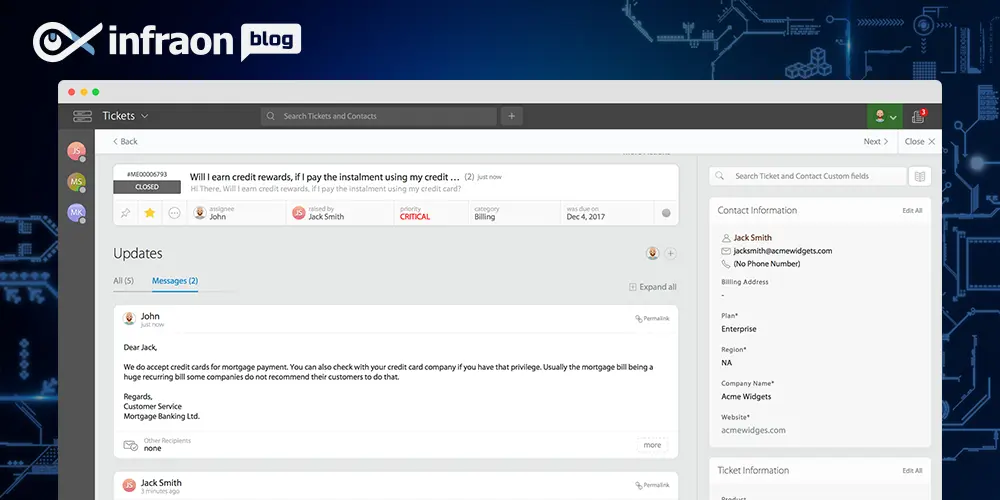
Use Cases:
HappyFox is a versatile solution suitable for businesses looking for a feature-rich, multichannel support platform with automation capabilities. It caters to organizations seeking to streamline communication and provide efficient support across a range of communication channels.
Pros:
- Multichannel support: HappyFox facilitates efficient support across email, chat, social media, and more, ensuring customers have multiple communication options.
- Automation: The platform offers advanced automation capabilities, reducing manual tasks, improving efficiency, and enhancing customer interactions.
- Reporting and analytics: HappyFox provides extensive Reporting and analytics tools, delivering insights into support performance, response times, and customer satisfaction.
Cons:
- Pricing considerations: While HappyFox offers competitive pricing, the cost may become a factor for smaller businesses with limited budgets, especially as user counts increase.
- Learning curve: The system’s feature-rich interface may require training for new users to fully grasp its capabilities.
AzureDesk
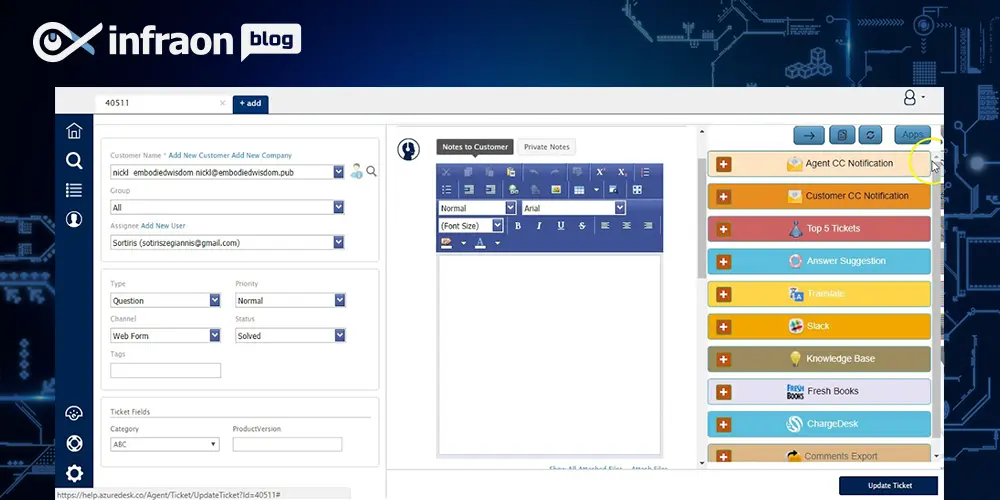
Use Cases:
AzureDesk is a versatile solution suitable for businesses seeking a feature-rich, multichannel support platform with customization options. It caters to organizations looking to enhance communication and provide efficient support across various communication channels.
Pros:
- Multichannel support: AzureDesk offers a multichannel approach to customer support, making it suitable for businesses looking to manage inquiries from various communication channels.
- Customizable: The platform provides extensive customization options, allowing easy system tailoring to meet support needs.
- Reporting and analytics: AzureDesk includes Reporting and analytics tools, offering valuable insights for optimizing support operations.
Cons:
- Potential cost considerations: While AzureDesk offers competitive pricing, the cost may be a factor for smaller businesses with limited budgets, especially as user counts increase.
- Learning curve: The system’s feature-rich interface may require training for new users to fully grasp its capabilities.
Hiver
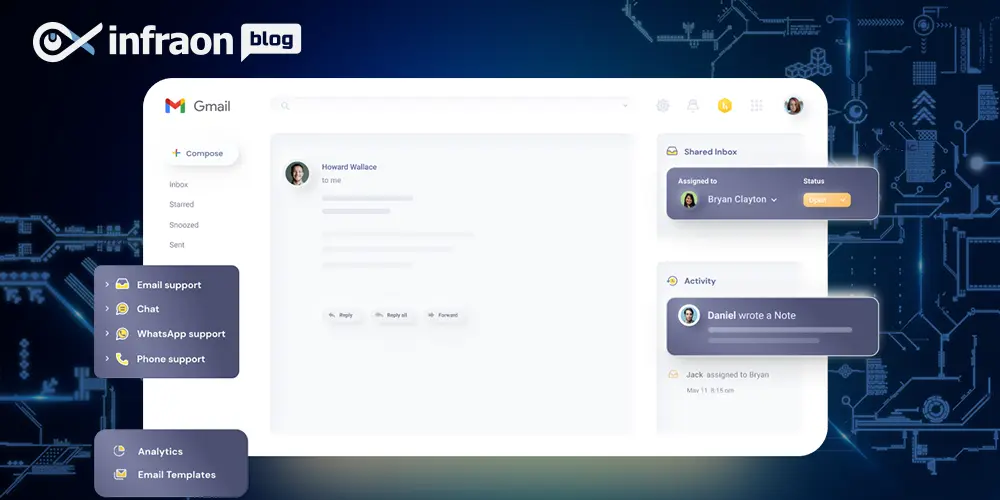
Use Cases:
Hiver is an excellent choice for businesses that rely heavily on email communication and seek to optimize email collaboration and management. It is particularly beneficial for industries where email is a primary means of communication and requires efficient team collaboration.
Pros:
- Email collaboration: Hiver focuses on email collaboration, making it an ideal choice for businesses heavily relying on email communication.
- Shared inboxes: The platform offers shared inboxes and email management features, fostering team collaboration and efficient email handling.
- Integration with productivity tools: Hiver seamlessly integrates with productivity and collaboration tools, enhancing its functionality and compatibility.
Cons:
- Industry-specific focus: Hiver’s specialization in email collaboration may limit its versatility for businesses outside email-intensive industries.
- Learning curve: The platform’s unique email collaboration features may require training and adaptation for support agents unfamiliar with this approach.
Related blog: 20 Best ManageEngine ServiceDesk Plus Alternatives in 2024
Conclusion
It’s clear that the future of customer service technology is bright with possibilities. These platforms will address customer issues while enhancing the customer journey, leveraging data to anticipate needs, and providing service that not only satisfies but delights. The right ticketing system is a catalyst for customer success, empowering teams to be more efficient, providing managers with insightful data, and most importantly, ensuring that every customer interaction is an opportunity to build a stronger, more positive relationship with the organization.











